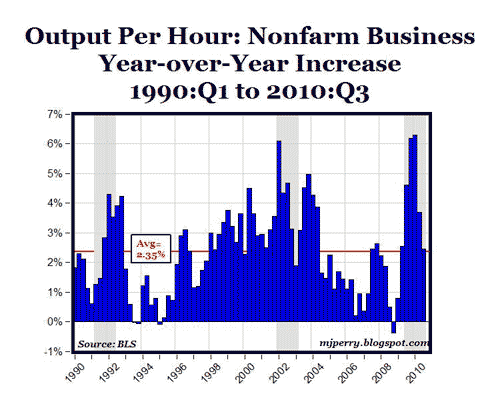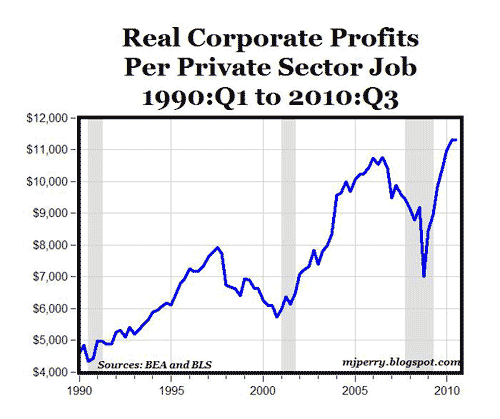

The chart above shows quarterly increases in worker productivity, using output per hour from the BLS for the nonfarm business sector. The shaded areas highlight the one-year periods following the end of the last three recessions (1990-1991, 2001, and 2007-2009), and show the huge surges in productivity in the early stages of the subsequent expansions – as companies learn how to “do more with less.” Notice that the productivity surge was greater following the 2001 recession than the 1990-1991 recession, and now the most recent productivity surge characterized by two consecutive quarters of gains above 6% (2009:Q3 and 2010:Q1) is much greater than the 2002 period. It’s partly those productivity surges that translate into “jobless recoveries,” and this time will be no different, and might actually be longer than the post-recession periods of weak job recovery following the last two recessions.
What motivated this post was a story in the Washington Post last Friday titled “Rising worker productivity, innovation boosts profits but may lessen hiring need,” and here are a few key points:
“Companies slashed 8.5 million jobs during the worst recession since the Great Depression while also slowing capital investment plans. Campbell, the world’s largest soup maker; DuPont, the country’s third-biggest chemical maker; and United Parcel Service, the world’s largest package-delivery business, are asking workers to help save cash by working smarter with existing technology. A potential cost: Efficiency gains reduce the chances that recession-casualty jobs will come back.
“When the productivity growth comes, then watch out because that is when companies start not needing so much labor,” Edmund Phelps, a Columbia University economist and Nobel laureate, said in an interview. Phelps says productivity growth works in long waves. In boom times, companies stock up on equipment. In lean times, they find ways to maximize performance of that equipment.
Growth in productivity, or output produced in an hour of work, averaged an annualized 3.4 percent in the five quarters since the 18-month recession ended in June 2009. That is similar to the 3.7 percent gain in the first five quarters after the 2001-03 so-called jobless recovery. The efficiency gains have paid off in corporate profits. Earnings from continuing operations of companies in the S&P 500 have rebounded 23 percent since the fourth quarter of 2007. Sales have declined 9 percent over the same period.”
Bottom Line: The good economic news is that the productivity of American workers has never been higher, and the recent huge productivity gains have translated into record-high profits for U.S. companies, measured both in the absolute dollar amount of after-tax profits, and also measured in real dollars of after-tax corporate profits per private-sector worker, which is at an all-time high of $11,312 and above the 2008 cyclical low of $7,000 by more than 60% (see bottom chart above). The bad economic news is that we might be in for several year of anemic job growth and a “jobless recovery,” as a result of companies being able to expand output and increase profits without increases in employment.
- Bulenox: Get 45% to 91% OFF ... Use Discount Code: UNO
- Risk Our Money Not Yours | Get 50% to 90% OFF ... Use Discount Code: MMBVBKSM
Disclaimer: This page contains affiliate links. If you choose to make a purchase after clicking a link, we may receive a commission at no additional cost to you. Thank you for your support!


Leave a Reply